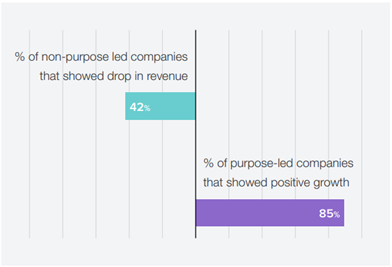Finding Employees That Match Your Company’s Mindset Can Be a Challenge That’s Ultimately Worthwhile

What does purpose mean? It could be what gets you out of bed in the morning without wanting to stick your head back under the pillow and snooze the day away. It could be the little glimmer of light you cling to when things get very dark and murky and there doesn’t seem to be a way forward. When it comes to work, purpose means a job that provides fulfillment, something that has a deeper meaning than pay, perks and status. Something that ignites a little fire in your belly and makes you keep turning up, day after day, even when things get tough.
Matching people to roles in the recruitment industry is not too much of a challenge. Finding people for whom purpose matters with the right skills and motivation to stay put for a while and not be lured away by money, perks and benefits, however, is where recruitment becomes more about the connection than the transaction—understanding the candidate, what motivates them and how they fit on a deeper level with the position they’ve applied for.
This is especially challenging when people are looking to transition from mainstream work to a more purpose-oriented career. They could have the right skillset and feel passionate about the business and its mission but find the transition comes with a discount on earnings (it usually does), which can be a tough pill to swallow.
Oftentimes there is a belief that the move to more purpose-driven work will bring with it an end to those bad days in the office. Surely everyone will be so energized and motivated by the contributions they’re making to the world that everyone will love coming to work! The reality is that these roles have the same challenges as their corporate counterparts—budget pressures, operational complexities and personality clashes—so candidates need to be screened thoroughly for everything from experience to motivation to expectations.
Having someone on your team who really believes in what they are doing and is happy to show up to work every day is invariably a better situation than someone who drags their feet, calls in sick and needs to be constantly monitored to meet deadlines. There is, however, also evidence that finding purpose-oriented people can have a significant impact on profit, job satisfaction and (therefore) employee tenure.
Recruiting people with a mindset that is aligned to the values of the organization helps to embed a purpose into the DNA of the business, so that everyone working there lives it. It is evident in every project, every email and every activity the firm participates in or creates, rather than it being a dot point on a PowerPoint presentation or a feature of a marketing campaign communicated once and never spoken of again.
Looking for a job where you can put your talents to work making the world a better place? Search for a meaningful job on B Work, the largest impact-only job search platform.
Did You Know … Purpose Brings Profit?
There is a misconception that if a business focuses on purpose, it forgoes profit. Certified B Corporations show that this is not the case by demonstrating how businesses can shift focus purely from profit to incorporate social and environmental purpose while still delivering on shareholder expectations.
Global investment management firm BlackRock has increasingly focused its investments on those that make a positive impact on society, forcing many companies to rethink their growth strategies. In his 2018 annual letter to CEOs, BlackRock Chairman and CEO Larry Fink wrote:
“ To prosper over time, every company must not only deliver financial performance, but also show how it makes a positive contribution to society. Companies must benefit all of their stakeholders, including shareholders, employees, customers, and the communities in which they operate.”
In 2015 the Ernst & Young Beacon Institute and Harvard Business School conducted research titled “The Business Case for Purpose,” with purpose defined as “an aspirational reason for being which inspires and provides a call to action for an organization and its partners and stakeholders and provides benefit to local and global society.” The research unearthed some interesting insights into the impact purpose has in the business space, showing how it goes beyond a purely altruistic philosophy or something that is “nice to have” but has little impact on the bottom line so is rarely prioritized.
Having a clear, single-minded purpose that connects with customers on a values level gives your business a better chance of cutting through the clutter and staying in their minds when it comes time for them to make purchases or engage in services, according to the Ernst & Young and Harvard report.
“The sense of being part of something greater than yourself can lead to high levels of engagement, high levels of creativity, and the willingness to partner across functional and product boundaries within a company, which are hugely powerful,” said Rebecca Henderson, the John and Natty McArthur University Professor at Harvard Business School. “Once they’re past a certain financial threshold, many people are as motivated by intrinsic meaning and the sense that they are contributing to something worthwhile as much as they are by financial returns or status.”

There are clear connections between business performance and purpose, according to a 2016 report from LinkedIn and Imperative: 85% of companies that prioritize purpose showed growth, while 42% of non-purpose-led companies showed drop in revenue.
Hiring people who are aligned to your purpose, then, means that you are more likely to see your bottom line grow and experience a real impact on your business performance.

Did You Know … Purpose Brings Job Satisfaction?
There is a clear correlation between job satisfaction at work and purpose orientation: 73% of purpose-oriented people are satisfied in their jobs. This is consistent across country, culture, language or occupation, according to the LinkedIn and Imperative report.
Understanding someone’s purpose orientation is about understanding what drives them to initially apply for and perform in a job once they are employed. Finding staff who are motivated is tough. Finding staff who are committed to your company and won’t jump ship if offered a more attractive salary is even tougher. A real challenge a recruiter has is trying to determine how happy a candidate will be in the role they’ve applied for by figuring out what motivates them to apply for the role. Sometimes it will be money above all, which will suit certain roles, but a candidate’s motivation typically is more complex.
Why is understanding motivation so important, both in the recruitment process and in maximizing the performance of existing employees? In his 2009 Ted Talk, Dan Pink talks about the tricky art of motivation. Social studies have shown us, he says, time and time again, that extrinsic rewards like money and incentives motivate people for straightforward tasks: manual work with simple solutions. The problem with these findings is that not many people work within those parameters these days. They require answers to complex workplace problems that have a non-linear path to solutions. Sometimes there isn’t an answer, and they need to course correct or simply monitor a situation. In short, Pink says, incentives actually dull thinking and block creativity.
A clear illustration of this is seen in The Candle Problem, a logic puzzle from 1945 that shows how people motivated by money are slower to complete the task than those who are simply timed. When the problem was presented to the group in an easier format that required less creative thinking, the incentivized group outperformed the other.
How do businesses find these elusive, purpose-oriented people who are motivated by what the business does or stands for, and how to they hang onto them? It may not be so hard. According to Pink, you need to recruit people for whom a sense of purpose is key, offer them enough money so that it’s not an ongoing concern and, once employed, offer people Autonomy, Mastery and Purpose within their role. Critically, you must have this ethos as part of the firm’s DNA. Essentially allow people the freedom to direct the way they work, wiggle room to become really, really good at something, and a sense of buy-in to the firm’s bigger picture.

But How Do You Find These People?
The Right Network
We know the positive impact purpose can have on an organization, and how aligning purpose-oriented individuals with purpose-oriented businesses can spark joy, improve business performance and enhance job satisfaction. But where are these people hiding?
Finding candidates for whom purpose brings a sense of fulfillment comes down to having an extensive network to tap into and knowing how to build this network. One of the trickiest aspects of the search is the fact that more often than not, these people will be passive candidates who aren’t actively looking for a new position.
The right recruiter will build a network of people they identify as purpose-driven through everyday interactions—conversations they have in the coffee shop, friends of friends who speak in terms that trigger the recognition of a like-minded individual, or candidates who have applied for other, more mainstream roles they were not quite right for. They may not be looking, but keeping them on the radar and touching base from time to time opens you to their network of contacts who may share the same way of thinking and in fact unearth the right person for the role you’re looking to fill.
Look Beyond Skillset
Look beyond skills and experience when it comes to a candidate search. Seek aligned passions and interests: What do they care about? Someone active in their local council in recycling efforts may not be the right fit when working for a company that produces large amounts of plastic waste, for example, but could be a perfect fit for a company that has a clear commitment to sustainability (even if they’ve only just started on the journey) where they could have a real impact in driving this agenda. The right candidate is so much more than a sum of experience, education and skillset.
Think About Your Employee Brand
The right recruitment firm can find people with a purpose-driven mindset. But to keep these individuals engaged and interested, organizations must incorporate the company purpose into their employment brand: culture, mission and product.
Ask the Right Questions
When it comes to interviewing candidates, focus the conversation more on culture and vision than perks and benefits. Ask the right questions: What motivates you? What do you value most about work? How important is a sense of purpose to you? What makes you leap out of bed in the morning?
The best starting point is to ensure all execs and employees align on and buy into your company’s purpose, which must be clear and understood by all. If your purpose is to make money, your culture will reflect this, and you may not attract the more creatively minded problem-solvers. If your purpose is built around financial objectives, consider what happens to your culture when you miss your targets for the year.
There is no easy way to attract motivated individuals, retain them for longer, all the while meeting your profit and shareholder expectations. It’s like a big jigsaw puzzle with very human parts.
Before you can attract the right people to your business, the first and most important step is to determine if you are a purpose-oriented business, then consider how that purpose is embedded into your business.
If it’s not, start the journey. Include your purpose in your mission and strategy, allocate resources to it and make it a priority that everyone knows about. Then can engage the right recruitment service to ensure you are bringing like-minded, value-aligned candidates into the business. If your purpose resonates at every level, you will see the people you bring in really shine and propel your business forward.
Certified B Corporation Talent Nation is a recruitment firm that specializes in purpose-oriented recruitment in the sustainability, environmental, energy and not-for-profit markets.
B the Change gathers and shares the voices from within the movement of people using business as a force for good and the community of Certified B Corporations. The opinions expressed do not necessarily reflect those of the nonprofit B Lab.

The Search for Purpose-Driven Workers: Where Job Skills, Salary and Fulfillment Meet was originally published in B the Change on Medium, where people are continuing the conversation by highlighting and responding to this story.